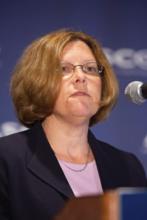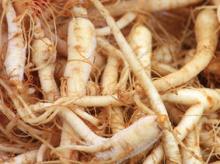CHICAGO - The anti-inflammatory properties of ginseng show promise for cancer-related fatigue that merits further attention, according to accumulating studies.
Inflammation is posited to be one of the physiological mechanisms underlying cancer-related fatigue, said Debra Barton, Ph.D., of the department of oncology at Mayo Clinic Cancer Center in Rochester, Minn.
"Inflammation causes an increase in cortisol, which then causes anti-inflammatory cytokines to be secreted to act as a feedback loop to get us back to homeostasis. The hypothesis is that this whole system may not be functioning optimally in patients with [cancer-related] fatigue," she explained at the annual Chicago Supportive Oncology Conference.
A study of fatigued breast cancer survivors revealed significantly higher serum levels of several markers associated with proinflammatory cytokine activity and significantly lower serum levels of cortisol than were present in nonfatigued patients (Psychosom. Med. 2002;64:604-11).
In metastatic cell lines, ginseng inhibits the up-regulation of MAP (mitogen-activated protein) kinase, so there might be some direct impact on inflammation, she said.
In a randomized, double-blind, dose-finding study by Dr. Barton and her colleagues, approximately two to three times as many patients taking 1,000 or 2,000 mg daily of American ginseng reported satisfaction with treatment and improvements in fatigue, compared with those patients who took placebo (Support. Care Cancer. 2010;18:179-87).
In all, 282 cancer patients with advanced or early disease who were either on or off treatment received 750 mg, 1,000 mg, or 2,000 mg of ginseng daily or placebo twice daily over 8 weeks. "We were just trying to get an idea of [whether there is] a signal, what dose should we use, and in what population," she said. In all, 25% of patients on 1,000 mg and 27% of patients on 2,000 mg said they felt "moderately better" or "much better," compared with only 10% of patients in both the 750-mg and placebo groups.
As a follow-up to that pilot study, Dr. Barton and her colleagues are finishing a large, randomized trial of 2,000 mg of ginseng vs. placebo in breast cancer patients. In addition to looking at patient perceptions of benefit on the physical subscale of the multidimensional fatigue symptom inventory–short form, the study will measure cortisol and other markers in blood and saliva to look at relationships between these markers and fatigue at baseline and over time in the two arms.
Less promising were data on methylphenidate. Recent studies of the psychostimulant modafinil/armodafinil have not yielded stellar results, according to Dr. Barton, who is also a registered nurse. Although two very small studies indicated significant improvements in fatigue among patients on 200-mg modafinil vs. placebo (J. Palliat. Med. 2009;12:433-9; Palliat. Med. 2009;23:325-31), a much larger study of 867 patients found no significant differences over four cycles of chemotherapy and a trend toward improvement only among patients with the most severe fatigue (Cancer 2010;116:3513-20).
Dr. Barton disclosed that she has received study supplies from Ginseng Board of Wisconsin and Ortho-McNeil Janssen Pharmaceuticals Inc.



